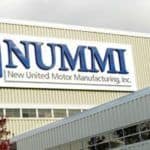NUMMI Tour Tale #1: Why Fix the Escalator?
 The NUMMI tour guide told an interesting kaizen story as we went past the body weld area. Car bodies are held and transported on metal carrier racks that re-circulate through the welding process. The bodies move on to painting and the racks cycle back all day long. The racks get greasy and dirty from the process (Note: It's not grease, see comment at the end of the post), so workers were cleaning the racks by hand with wire brushes. This took 4 hours to do, once a week, shutting the line down, I assume.
The NUMMI tour guide told an interesting kaizen story as we went past the body weld area. Car bodies are held and transported on metal carrier racks that re-circulate through the welding process. The bodies move on to painting and the racks cycle back all day long. The racks get greasy and dirty from the process (Note: It's not grease, see comment at the end of the post), so workers were cleaning the racks by hand with wire brushes. This took 4 hours to do, once a week, shutting the line down, I assume.
An operator had an idea to instead cover the rack bases with plain old aluminum foil. After a week, they remove the dirty foil and replace it, which takes only 1 hour instead of 4. The team member received a cash bonus for the suggestion.
I think that was a clever idea, one that saves the company money, even with the cost of aluminum foil factored in.
But, could one push farther to a root cause here? Why are they having to clean those racks? Is there anything that can be done to prevent the racks from getting dirty, or slowing that down? I'm not a welding expert, so I can't say, but it's interesting to think about.
Go To NUMMI Tour Tale #3: The Power of Why
What do you think? Please scroll down (or click) to post a comment. Or please share the post with your thoughts on LinkedIn – and follow me or connect with me there.
Did you like this post? Make sure you don't miss a post or podcast — Subscribe to get notified about posts via email daily or weekly.
Check out my latest book, The Mistakes That Make Us: Cultivating a Culture of Learning and Innovation:










I’ve seen a similar set-up like this at the Audi plant in Ingolstadt, Germany. They were using aluminum wrap to prevent the racks from being covered in some sort of glue (?) in the body shop area, if I remember correctly.
Audi practices TPM, of course.
But, again, could one push farther to the root cause there?
Actually, it is most likely that what they were brushing off was not grease, but welding spatter. During the welding process, all those sparks you see flying through the air are actually small burning spheres of metal. Those spheres were likely sticking to the frame. They cannot be eliminated from the process. If it was just gresae, they could use a pressure washer to remove.
Without adding more cost, I wonder if they can use some sort of flux. May be they could integrate the flux onto the foil. May be high temperature Teflon/Pyrex coated foil on the spot-welders. They would have to experiment.
I think the spot-welder arms themselves are copper (conducts the needed amps the best for a spot-weld). Not sure if the metal structure of the arms could be changed.
Any chemist out there? As with any weld, there is a chemical reaction going on. What could reduce free flying particles? Is there away to get the particles not to fly or bond back to the source?
Troy Lee
The welding spatter can be eliminated if proper welding equipment is used and the parts fit properly. Electric servo guns are the answer on several levels. My guess is the material on the racks is not spatter from weld guns however. It is most likely over spray from paint applications or glue applications.
Some of the racks are immersed in solutions of primer paint, or other compounds.
[…] Go To NUMMI Tour Tale #2: The Power of Reynolds Wrap […]